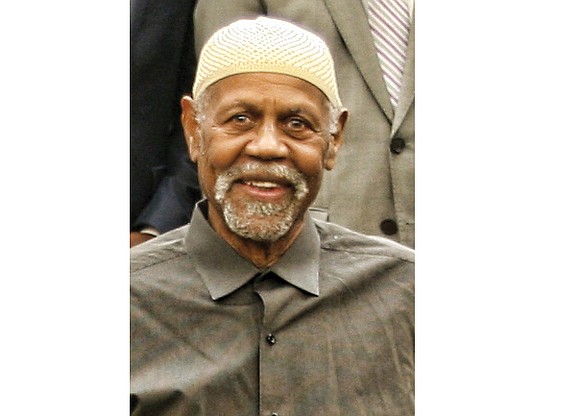Personality: Fattah Muhammad
Spotlight on community activist and founder of RACE
4/13/2017, 8:08 p.m.
Fattah Muhammad began marching in the streets of several North Side and East End neighborhoods in 1980 to help end violence plaguing these communities and encourage cooperation with Richmond law enforcement.
With a bullhorn and a mission, he was a concerned citizen who says he could not stand by and do nothing while another life was lost to senseless violence.
“In Chimborazo, people were afraid to come around. Older people did not want to sit on their porches because they knew of people who’d been shot just sitting there,” he says. “We started working with people in the community there and began building up.”
In 1982, he worked with other activists and concerned residents to found RACE, Rescue Aid Community Everywhere. Focusing on several neighborhoods and public housing communities in the East End and North Side, the organization diligently worked to build better relations between residents and the police who served them.
On Monday night, Mr. Muhammad was recognized by Richmond City Council for his decades of “hard work and dedication” in trying to build community relationships and for his mentorship of young people in the Blackwell, Oak Grove, Hull Street and Jefferson Davis areas.
The 76-year-old found out he was to be honored only hours before the City Council meeting. And though he faced a chemotherapy treatment the following day as part of his battle against stomach cancer, he says he had to be there to accept the award.
“It really makes me feel good, you know?” he says. “We didn’t get a lot of money or anything to support what we were doing. But we knocked on doors, marched in the streets.”
Mr. Muhammad’s community activism went beyond neighborhoods battling the impact of chronic violence. When City Councilwoman Reva M. Trammell first ran successfully in 1998 to represent the 8th District where Mr. Muhammad lives, he became her advocate and participated in her campaign.
“He introduced me to everyone,” Ms. Trammell says. “He told them, ‘Don’t see her as a white woman because she is going to represent all of the people all of the time.’ ”
Ms. Trammell said his battle with cancer has weakened his body, but not his spirit and sense of purpose. “We started community policing by learning how to trust the police, bringing people together and having meetings because we are all people,” she says, emotion rising in her voice. “We are family. And he doesn’t want to stop. We would still be marching if he wasn’t sick.”
Though he admits the cancer has slowed him down some, he plans to attend the monthly 8th District meeting on Thursday, April 20.
He’s a regular, Ms. Trammell says. “He’s always been there.”
The solution for ending violence in the community, Mr. Muhammad says, is to get involved before it ever happens.
“You see parents screaming and hollering and crying on the news when their child gets killed. And after that, you don’t see or hear anything from them.
“If your child is standing out on the corner, go out there. Don’t act like you don’t know what they are doing.” Meet this week’s Personality and community activist, Fattah Muhammad:
Occupation: Retired from CSX railroad.
Date and place of birth: July 24 in Charles City County.
Current residence: Richmond’s South Side.
Family: Wife, Barbara, and seven children, Bashan, Yusef, Lateefa, Jendaihi, Fathiyah, Niyyah and Fattah.
Community involvement: Founder of Rescue Aid Community Everywhere, or RACE, started in Church Hill.
How I got the news that I was the award recipient: City Council member Reva M. Trammell, who represents the 8th District, called and asked me to come down to City Hall because they were going to recognize me.
What this award means to me: It means a whole lot because it shows that the City of Richmond does care.
Why are some communities disproportionately impacted by violence: People are not involved in their own communities. Sometimes it takes someone getting killed, or money, for people to get involved, but it shouldn’t work that way.
What can be done to improve community and law enforcement relationships: The community needs to come together around law enforcement and cooperate with them. In our city, the police officers get out and talk to the people, walk the neighborhoods. That’s one thing that I see as a positive.
My outlook for the day: I wake up always trying to do something to help the community understand that (in committing violence against one other), we’re running in the wrong direction.
If I could have my wish, it would be: That all of the gang activity would end. Crips, Bloods, whatever — just end it. I just wish they would change their mind and look at life from a different perspective.
Three words that best describe me: I can only think of one — concerned.
How I unwind: I come home and talk with my wife. I stopped looking at the news because it’s depressing. But in reading papers like the Richmond Free Press, I see some of the good work that we’ve done.
Nobody knows I: Have experienced the street lifestyle and it’s no way for anybody to go.
What motivates me: There are so many people going the wrong way. Being incarcerated is no place for a human being to be. And that (drove) me to get more involved.
My next goal: I want to make people aware and get them more involved in making our communities better. They say that Black Lives Matter. If it really matters, stop killing one another in the street. We need to show concern about the fact that our lives matter.







